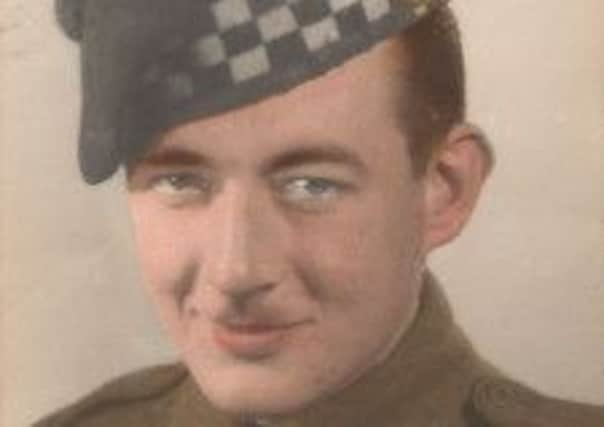Obituary: Sergeant Frank Henderson, soldier and civil servant


FRANK Henderson fought as a mountain warfare specialist with the Lovat Scouts during the Second World War and was one of the last survivors of the distinguished Scottish regiment.
Henderson, who has died aged 91, was naturally suited to a rigorous outdoor life and this was immediately recognised by the Lovats, which formed the British Army’s first sniper unit. They had been raised in the Boer War by Simon Joseph Fraser, father of the Second World War commando Simon Fraser, 15th Lord Lovat, and uncle of David Stirling, founder of the Special Air Service.
Advertisement
Hide AdAdvertisement
Hide AdHe joined the Local Defence Volunteers, later known as the Home Guard, in 1940, aged 18. “Our only weaponry consisted of one rifle – an ancient Canadian Army Ross rifle – per five men, plus five rounds of ammunition per rifle,” he recalled. He soon enlisted in the Argyll and Sutherland Highlanders, but transferred to the Lovats after being passed as of exceptional fitness.
Henderson trained in the Canadian Rockies, having experienced the mountains of Scotland and Wales. His 21st birthday was spent on a troopship, being violently sick as the vessel zig-zagged in heavy seas to avoid submarine attack. On arrival in New York, he was struck by the contrast of bright lights with the black-out conditions of Liverpool. He became an expert in skiing, ice climbing and Arctic survival, but the training was tough and he had a couple of narrow escapes in dramatic falls.
After returning to Britain, he and the rest of 12 Troop, C Squadron were posted to Italy, arriving in Naples in 1944. They advanced through scenes of heavy fighting, including Cassino, which he described as “utter and total devastation. Not a house remained that was recognisable as such. Indeed, seldom a piece of wall more than 3-4ft high, fields pocked with overlapping shell holes and the monastery brooding over it all in an almost ideal defensive position.”
During a patrol, the men occupied a farmhouse and were about to enjoy some wine when their Italian host indicated an enemy was upstairs. Henderson approached the hiding place and, in his best schoolboy German, invited the fugitive to come out. There was no reply. He prepared a hand grenade and started counting to five. “This brought an immediate ‘kamerad’ and out came an SS corporal, with his hands up,” he later wrote. Minutes later, as they continued their patrol, the platoon was ambushed, killing one man and wounding two others.
One day during a rest period, he was struck down by acute pain in the belly and lay doubled up by the roadside. A passing general stopped his Jeep, poked him with his stick and asked angrily what he thought he was up to. “I explained my problem. ‘What’s your regiment?’ he barked. ‘Lovat Scouts, Sir’ I replied. At once his tone changed. ‘You’re going down, you must be sick, hop in’ and he gave me a lift more or less to our destination.” That night they were machine gunned by an American aircraft, wounding a little Italian boy.
The rest of his war was spent in close contact with German forces and he once spent four days undetected behind enemy lines on a daring reconnaissance mission that earned his patrol leader a Military Medal. On another occasion, he saved the life of a surrendering enemy – a Romanian soldier in German uniform – after ignoring his officer’s order to shoot the helpless man, taking him prisoner instead.
Francis Stewart Henderson was born on 30 December, 1922 in Perth, the son of a Caledonian Railway clerk and a nurse, and grandson of the author Alexander Stewart. He joined the Home Civil Service in January 1940 with the Post Office Savings Bank in London, moving to Harrogate after a department was evacuated. There he witnesses the town’s single air raid, when a German aeroplane attacked the Majestic Hotel, resulting in one death.
Attempting to enlist in a Highland regiment in Harrogate, he was palmed off with the Bedfordshire and Hertfordshire Regiment. On a trip home to Aberfeldy, he joined the Argylls, later describing his Young Soldiers Battalion as a “mixed bag”. After the battalion was broken up, he was accepted into the Lovat Scouts, whose commanding officer was Cameron of Lochiel.
Advertisement
Hide AdAdvertisement
Hide AdAfter the German surrender, the Lovat Scouts moved to Austria to hunt for fugitive Nazi and SS personnel. Occupying the village of Ebene Eichenau in the Alps, the men received a surprisingly friendly welcome from the locals. “It was hard to realise they had been our enemies”, Henderson reflected. He served in Greece before leaving the army as a sergeant in 1946. Returning to civilian life, he moved back to Scotland to help set up the new National Health and National Insurance schemes. To his delight, he was posted to Perthshire and was able to spend time at the family home in Aberfeldy.
He later transferred to the Forestry Commission and worked in Inverness, where he was chairman of Highland Ski Club. He lived in Broughty Ferry and Aberfeldy before retiring as a senior member of the Western Conservancy Glasgow in 1982.
Following his retirement, he remained active and had many years’ involvement with Fountains Forestry, as a part-time health and safety adviser, and the Younger Ben More Trust, as factor. He worked on in this capacity well into his 80s and spent his final years in the family home in Lenzie.
Henderson was predeceased by his wife of nearly 60 years, Ruby, in 2011 and is survived by his sons Colin, Iain and Donald, and four grandchildren.